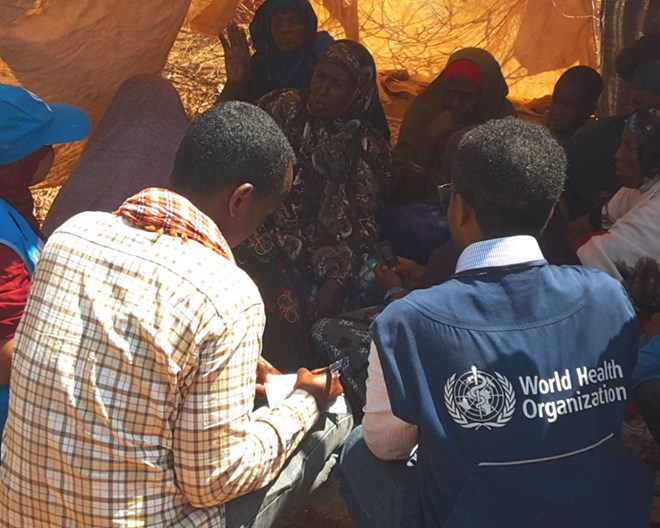
Saturday March 18, 2023

Mogadishu (HOL) - The World Health Organization (WHO) is increasing its health response in the Dollo Zone of Ethiopia's Somali Region to provide essential services to refugees and the host population. The region has seen an influx of around 100,000 refugees, primarily women, children, unaccompanied minors, and sick or wounded individuals from Somalia since February 2023. The Dollo Zone is facing the worst drought in over 40 years in the greater Horn of Africa, resulting in thousands of households experiencing food insecurity, an increase in children with acute malnutrition, high population movement, and displacement of pastoralists searching for water. This has led to an increased risk of disease outbreaks, including measles and cholera, which could spread to vulnerable populations, including refugees.
The Somali region is facing several disease outbreaks, including a cholera outbreak with 271 cases and 17 deaths and widespread vaccine-preventable diseases. Malnutrition is also widespread, with an average of 1,800 severely malnourished cases admitted for treatment every week. The health system is already stretched and must cater to the thousands of refugees by providing delivery services for pregnant mothers, immunization for young children, managing severe acute malnutrition, and preventing vaccine-preventable diseases to reduce deaths.
In collaboration with the Somali Regional Health Bureau (RHB), the United Nations High Commission on Refugees, and other health partners, WHO is facilitating a timely health response to the refugees in the Dollo Zone. WHO is co-chairing the health sector coordination platform with the Somali RHB at the subnational and zonal levels, facilitating health sector assessments, planning, and response. WHO Ethiopia has delivered 12 interagency emergency health kits and severe acute malnutrition treatment kits to all the health facilities in Dollo Zone. WHO has also redeployed staff and brought on more technical experts in response to the health crisis in the region.
Dr. Nonhlanhla Dlamini, Acting WHO Representative to Ethiopia, said, "We will continue to advocate for the deployment of more healthcare personnel and medical supplies to support the health facilities as they deal with multiple health emergencies." The influx of refugees from Somalia into the Somali region of Ethiopia puts an enormous strain on the humanitarian response, which is already stretched by concurrent challenges.
USD 5.86 million will be needed by WHO to provide health assistance and ensure the continuity of essential health services for affected communities in the Dollo Zone of Ethiopia's Somali region.
The United Nations has launched an
appeal for $137 million to help those displaced by drought and conflict. Over eight million people in Somalia, Ethiopia, and
Kenya require food assistance, and over three million refugees and internally displaced people are already forced to leave their homes. As the region enters its
sixth consecutive rainy season with no rain, the UNHCR has warned that survival is a struggle for uprooted communities amid scarce water sources, hunger, insecurity, and conflict. The UN agency has pledged to provide basic relief items, emergency shelter, water trucking supplies, borehole drilling, cash assistance for the most vulnerable, and supporting health facilities to step up nutritional aid for women and children.